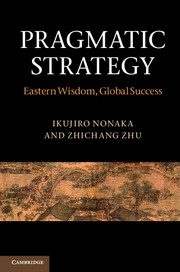Book contents
- Frontmatter
- Contents
- Figures
- Tables
- Cited classics
- Preface
- Part I Why pragmatism, why now?
- Part II What do pragmatic strategies look like?
- Part III What to do, how to do it?
- 5 Dealing with wuli–shili–renli
- 6 Timely balanced way-making
- 7 Orchestrating WSR, orchestrating the firm
- Part IV Think when we learn
- Notes
- References
- Index
6 - Timely balanced way-making
Published online by Cambridge University Press: 05 June 2012
- Frontmatter
- Contents
- Figures
- Tables
- Cited classics
- Preface
- Part I Why pragmatism, why now?
- Part II What do pragmatic strategies look like?
- Part III What to do, how to do it?
- 5 Dealing with wuli–shili–renli
- 6 Timely balanced way-making
- 7 Orchestrating WSR, orchestrating the firm
- Part IV Think when we learn
- Notes
- References
- Index
Summary
If dealing with wuli–shili–renli is what pragmatic managers do, how to do it? Readers familiar with the literature would say this question is about strategy process. We agree, but with an immediate qualification: pragmatically speaking, process cannot be properly understood if separated from contexts or contents – who you are, where you come from, what you want to achieve.
In previous chapters, we posited that pragmatic strategies usually emerge from purposefully guided, multi-path evolutionary processes and tend to be contingent, consequential, continuous, courageous, collective and co-creative. While such a view is useful in describing what practically wise strategies look like, the normative question for managers on-the-spot, confronted with an urgent mess, remains: how to do it, here-and-now?
Rather than supplying a proven methodology, x-step procedure or y-dimension grid, we shall present a pragmatic mode of strategising: timely balance. We shall begin by making a distinction between timely balance and the ‘golden mean’. Popular interpretations of the ‘golden mean’ will be shown to be theoretically problematic and unhelpful in practice. In contrast, timely balance, which embodies the Confucian ideal of pragmatism-upon-time, emphasises getting business right in unfolding circumstances. Instead of seeing strategies as determined by antagonistic opposites, pragmatism takes human experience as consisting of interdependent, reciprocal, generative companions.
- Type
- Chapter
- Information
- Pragmatic StrategyEastern Wisdom, Global Success, pp. 231 - 275Publisher: Cambridge University PressPrint publication year: 2012



